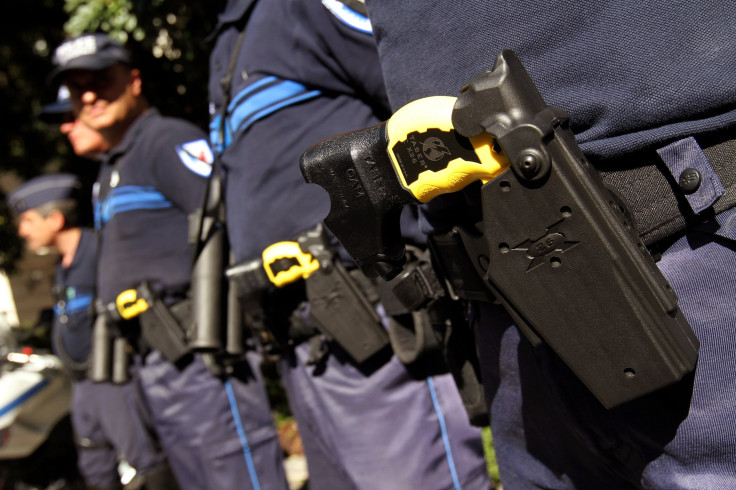Taser International, Synonymous With Stun Guns, Sees Police Body Cameras As Opportunity To Reinvent Itself

A number of camera manufacturers have had their stock prices surge after the White House announced plans to fund body cameras for police. Yet it’s Taser, the stun gun company, that might be best positioned in the emerging market thanks to an already-established network of relationships with the law enforcement community.
Taser International -- a household brand known also known for the infamous "Don't taze me bro!" incident at a Sen. John Kerry speech at University of Florida in 2007 -- wants to be known as more than just a stun gun company. And as the momentum for police body cameras gathered steam after the shooting of Michael Brown in Ferguson, Missouri, the company sees its chance.
“People get that we’re a technology company, not a weapons manufacturer,” said Steve Tuttle, vice president of Strategic Communications and one of the original five members of the company.
Yet Taser has quietly been selling body cameras for years, finding consistent growth in the still-new market and wondering all along if, just maybe, it will someday be known as a body camera company. After a number of high-profile controversies surrounding police use of the Taser stun guns, the company started equipping the stun guns with cameras and sensors that increased operator accountability.
“We thought if we only had a camera on there we could record what we were doing, so that’s what we did,” Tuttle said. “It didn’t take rocket science to say let’s put these cameras on our bodies.”
But Taser doesn't want to just sell the cameras. They want to sell services to the police departments as well. Along with rolling out a line of AXON body cameras -- which record video and audio feeds of an officer’s interactions with the public -- the company also unveiled Evidence.com in 2009. The Web service is essentially advertised as an ecosystem for law enforcement, encouraging police administrators to store not only body cam footage there but also PDFs, digital documents, crime scene photos, CCTV camera videos and other evidence more commonly housed in department store rooms.
The AXON body cameras range in price from $399 to $599 (no discount is available for departments buying in bulk), while a subscription to Evidence.com ranges between $15 and $55 per month, per camera depending on service and storage needs. Thanks to a Police Foundation study which determined that cameras led a more than 50 percent reduction in use-of-force complaints against officers, Taser’s sales bookings have skyrocketed.
Bookings -- defined as the total dollars in a deal, which is fulfilled as police departments make monthly contract payments -- have jumped from $1.3 million in the second quarter of 2012 to $11.4 million in the second quarter of 2014, according to company figures. Taser expects that number to grow to $15.3 million by the third quarter of 2015, yet Tuttle has attributed that growth to the Police Foundation study, not the controversy following the events in Ferguson. In 2013, Taser had sales of $137.8 million and net income of $18.2 million, so body cameras and services are already a meaningful contributor.
“I think people don’t realize that we hit this inflection point back in the second quarter of this year,” he said, adding that Taser already has connotations for police chiefs considering body cameras. “If you’ve got a viable product and its working, word gets around. We’ve already got relations with 17,000 law enforcement agencies. It’s easy to reach out to them.”
The company has sold 30,000 AXON cameras to 1,200 agencies. Leading customers include the Winston-Salem Police Department in North Carolina (623 cameras), the fort Worth, Texas Police Department (615) and Albuquerque, New Mexico’s Police Department, which has outfitted 600 officers with AXON cameras.
However there’s also a growing rivalry with fellow body camera-maker Vievu, which has sold 40,000 cameras to 3,900 agencies. There’s also the challenge of simply being able to keep up with the demand from local departments newly flush with cash. Yet Tuttle said the company has more difficulty convincing the law enforcement establishment to not only adapt to the new technology, but also accept that cameras aren’t only there to catch officers in the act.
“It’s there to provide a neutral observation to what really occurred,” he said. “Law enforcement is not in the 21st Century. This is a revolution in law enforcement, and there is a paying point, but it’s a paradigm that’s working.”
Other potential problems are more difficult to foresee. Tuttle said the company has yet to be hacked, and that increased demand will also encourage smaller companies whose failures to properly encrypt a video, for instance, will create an issue that impacts the entire body camera industry. Until then, Taser is content to be known as a stun gun company that’s sales “could” redefine it as a camera company.
“Trend certainly shows that you can’t afford not to have these,” Tuttle said.
© Copyright IBTimes 2025. All rights reserved.




















